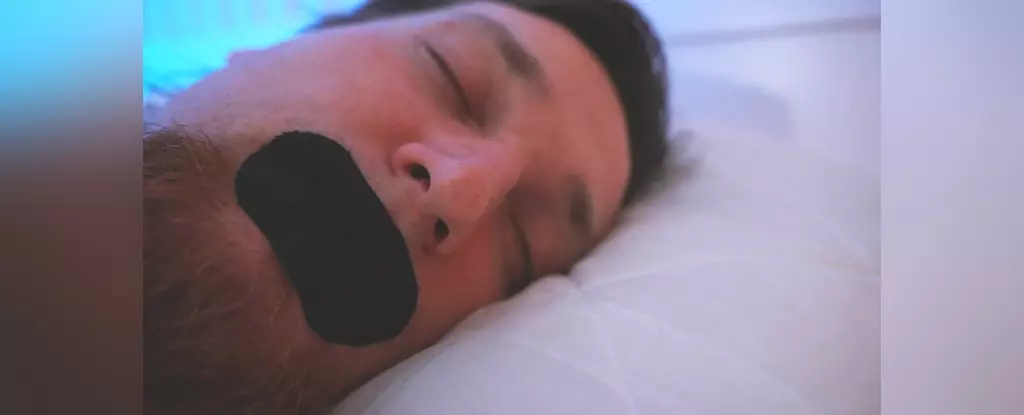In our digitally driven age, social media can sometimes propagate questionable health trends faster than scientific consensus can catch up. One trend that has recently gained traction on platforms like TikTok is mouth taping – a practice that involves sealing one’s mouth shut with specialized tape while sleeping. Advocates rave about its benefits, suggesting that it can rectify everything from snoring and sleep apnea to enhancing facial aesthetics and energy levels. While this might sound appealing, it is crucial to scrutinize the validity of such claims and understand the potential dangers lurking behind this nocturnal practice.
Understanding Mouth Breathing and Its Implications
Mouth breathing is often a symptom rather than a standalone issue. It usually arises due to nasal obstructions caused by conditions like sinus infections, deviated septums, or nasal polyps. For many, the act of breathing through the mouth at night is simply the body’s response to a physical blockage that restricts airflow through the nasal passage. Taping the mouth shut, therefore, does not address the core issue and could pose severe risks, particularly for those with genuine nasal obstruction. While some may find temporary relief and anecdotal benefits, it is vital to recognize that the underlying cause needs to be addressed for lasting improvement.
The Science Behind the Claims
A review of existing research on mouth taping reveals a sobering reality. While two studies indicated some level of improvement in patients with mild obstructive sleep apnea, the overall evidence supporting the effectiveness of mouth taping is alarmingly lacking. The studies reviewed found significant methodological flaws, including small sample sizes, inadequate follow-up with participants, and lack of control for confounding factors. We must ask ourselves – can we rely on such uncertain data to guide health decisions? The scientific community urges skepticism when encountering health claims that lack substantial backing.
Moreover, researchers cataloged the potential dangers associated with mouth taping, particularly the risk of asphyxiation in cases of nasal obstruction. This highlights a critical point: “quick fixes” often fail to consider the complexities of human health, particularly in a context as intricate as sleep medicine. While influencers might present mouth taping as a simple and effective solution, the reality is much more complicated.
The Risks of DIY Solutions
The temptation to seek simple, at-home remedies for sleep issues is understandable, especially for those struggling with insomnia or constant wakefulness due to a partner’s loud snoring. However, resorting to DIY methods like mouth taping can distract individuals from seeking professional medical evaluation – a necessary step in diagnosing and treating sleep disorders effectively. By prioritizing quick, viral solutions over medical advice, individuals may inadvertently prolong their discomfort and could miss serious underlying conditions that require intervention.
A doctor’s examination often provides a comprehensive understanding of one’s sleep patterns and any associated health conditions. Only a healthcare professional can offer tailored plans that effectively address symptoms while treating root causes. Therefore, it’s paramount for anyone experiencing sleep disturbances to consult with medical professionals rather than relying solely on social media trends.
In a world where health information is rapidly disseminated, it’s vital to approach trends like mouth taping with caution and skepticism. While it’s tempting to cling to quick-fix solutions, we must differentiate between anecdotal evidence and scientifically validated practices. Ultimately, sleep is a fundamental component of health, and addressing issues at the root cause should take precedence over superficial remedies. Instead of getting lost in a maze of social media claims, let prudence and professional guidance illuminate the pathway to restful sleep.

